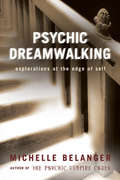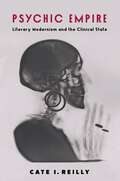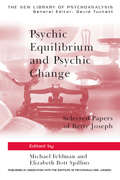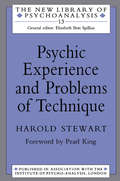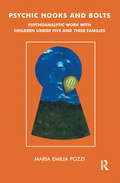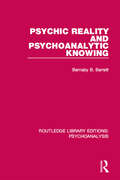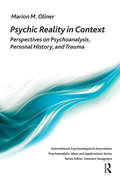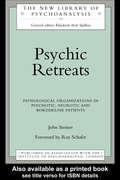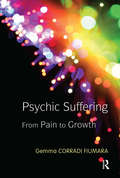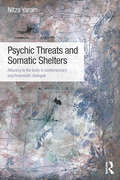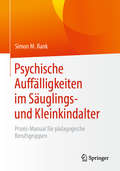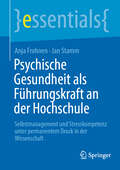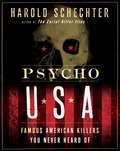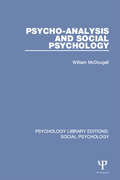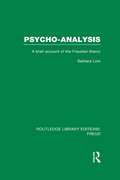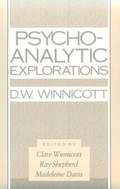- Table View
- List View
Psychic Dreamwalking
by Michelle BelangerNo single book ever before has brought together the history, theory and practice of dreamwalking--entering into another's dreamspace, even though you may be physically at a great distance. Michelle Belanger, the author of Psychic Vampire Codex, takes readers on an adventure into the subconscious world of dreams, territory that no amount of psychology or research has fully charted. This absorbing account, beginning with the author's own first experience of dreamwalking in a school bus as a child, both explains the phenomenon and teaches the techniques of dreamwalking. Learn to set up a dream space and a dream gate. Harness your dreaming mind to visit distant family members, pass vital messages to friends, even start secret trysts with your lover! Nobody knows exactly what happens when we dream, but practicing dreamwalking can and will open a whole new world in which the connections between ourselves and our spirit selves and others, as well as the meaning of dreams and the relationship of dreaming to other energy work and magick become clear.
Psychic Empire: Literary Modernism and the Clinical State (Modernist Latitudes)
by Cate I. ReillyIn nineteenth-century imperial Germany and the Austro-Hungarian Empire, new scientific fields like psychophysics, empirical psychology, clinical psychiatry, and neuroanatomy transformed the understanding of mental life in ways long seen as influencing modernism. Turning to the history of psychiatric classification for mental illnesses, Cate I. Reilly argues that modernist texts can be understood as critically responding to objective scientific models of the psyche, not simply illustrating their findings. Modernist works written in industrializing Central and Eastern Europe historicize the representation of consciousness as a quantifiable phenomenon within techno-scientific modernity.Looking beyond modernism’s well-studied relationship to psychoanalysis, this book tells the story of the non-Freudian vocabulary for mental illnesses that forms the precursor to today’s Diagnostic and Statistical Manual of Mental Disorders. Developed by the German psychiatrist Emil Kraepelin in the 1890s, this psychiatric taxonomy grew from the claim that invisible mental illnesses were analogous to physical phenomena in the natural world. Reilly explores how figures such as Georg Büchner, Ernst Toller, Daniel Paul Schreber, Nikolai Evreinov, Vsevolod Ivanov, and Santiago Ramón y Cajal understood the legal and political consequences of representing mental life in physical terms. Working across literary studies, the history of science, psychoanalytic criticism, critical theory, and political philosophy, Psychic Empire is an original account of modernism that shows the link between nineteenth-century scientific research on the mental health of national populations and twenty-first-century globalized, neuroscientific accounts of psychopathology and sanity.
Psychic Energy: Its Source and Its Transformation (Bollingen Series #670)
by Mary Esther HardingA study of the primitive and unconscious aspects of man's nature and the processes by which their energies may contribute to the integration of personality. New edition, comprehensively revised and enlarged, with many new illustrations.
Psychic Equilibrium and Psychic Change: Selected Papers of Betty Joseph (The New Library of Psychoanalysis)
by Michael Feldman Elizabeth Bott SpilliusBetty Joseph's work has become an outstanding influence in the development and theory of psychoanalytic technique in the Kleinian tradition. This collection of her most important papers examines the development of her thought and shows why a crucial part of her theory and practice is concerned with the detailed, sensitive scrutiny of the therapeutic process itself. Fundamental and controversial topics explored and discussed include projective identification, transference and countertransference, unconscious phantasy, and Kleinian views on envy and the death instinct.
Psychic Experience and Problems of Technique (The New Library of Psychoanalysis #Vol. 13)
by Harold StewartHarold Stewart, a distinguished psychoanalyst of more than 30 years' experience, began his medical career as a general practitioner. He was drawn first towards hypnotherapy, then to psychoanalysis, as a more sensitive, productive and far-reaching method of exploring patients' problems. In this book Stewart draws deeply on his own clinical experience to focus on changes in the patient's experience of inner space, and to record the growth of his own understanding of the patient's experience and how this can change. Beginning with a vivid account of the role of collusion in the myth of Jocasta and Oedipus, he goes on to a theoretical discussion of thinking, dreams, inner space and the hypnotic state, in the context of extensive clinical experience. The second part of the book centres on practical clinical issues and problems of technique, tackling in particular the role of transference interpretations, other agents of change, and the problems encountered in benign and malignant types of regression. The wealth of clinical material and the author's informality and openness in presenting his experiences of working with very disturbed patients will be of immense practical value to other practitioners. Psychic Experience and Problems of Technique will help psychoanalysts and psychotherapists to understand the nature of clinical problems which are often encountered but seldom acknowledged.
Psychic Hooks and Bolts: Psychoanalytic Work with Children Under Five and their Families
by Maria Pozzi Monzo'In this book it is made plain that complex and powerful understanding can take place in brief work. The baby's development is carried forward, the family re-groups differently, and understanding brings a change in behaviour.'- Lisa Miller, from the Foreword. 'This book focuses on young children as old as five and the parents and siblings who live with them. It wants to explore deep, unconscious connections between children and parents, especially in those cases where symptomatic behaviours develop and turn a potentially pleasant and satisfying family life into hell.' - This fascinating and comprehensive work is divided into two parts. The first gives the theoretical background to the subject, outlining the main theories of the pioneering Melanie Klein, Wilfred Bion and Donald Winnicott. The second part deals with the clinical cases that illustrate issues such as post-natal depression, separation difficulties, eating problems, bereavement and loss, learning disabilities and hyperactivity.
Psychic Reality and Psychoanalytic Knowing (Routledge Library Editions: Psychoanalysis #3)
by Barnaby B. BarrattHow do we know our mental life, and how is our mental life altered by our efforts to know it better? Originally published in 1984, this title attempts an epistemological and ontological discourse concerning the understanding of human mental processes, and it aims toward a definitive thesis on the dialectics of knowing and being in this work of psychological understanding. What this work reconfronts are questions pertaining to all psychology and to all human sciences. Yet much of its focus is on the understanding of unconscious mental contents, on the question of knowing and being in Freud’s psychology.
Psychic Reality in Context: Perspectives on Psychoanalysis, Personal History, and Trauma (The International Psychoanalytical Association Psychoanalytic Ideas and Applications Series)
by Marion Michel OlinerThis book skillfully combines autobiographical stories with clear psychoanalytical theories. During her childhood, the author experienced the Holocaust and was left understandly traumatised by it. It was her desire to confront this trauma that led her to psychoanalysis. For decades, the coherence of psychoanalysis seemed to be threatened by the conflicting thinking of many psychoanalytical colleagues about trauma and trauma affect, and also about the influence of external reality on the psychic reality discovered by Freud. However, the author counters this potential conflict with her innovative theoretical integration, combined with remarkable conceptual outcomes and treatment techniques. This book spans the author's work over the last fifteen years on the impact of external reality on psychic reality. During this period many analysts, especially in the English-speaking countries and Germany, where historic events loomed large in the lives of their patients, have turned from the exclusive emphasis on psychic reality to greater attention to the traumatic impact of external reality.
Psychic Retreats: Pathological Organizations in Psychotic, Neurotic and Borderline Patients (The New Library of Psychoanalysis #No.19)
by John SteinerEssentially clinical in its approach, Psychic Retreats discusses the problem of patients who are 'stuck' and with whom it is difficult to make meaningful contact. John Steiner, an experienced psychoanalyst, uses new developments in Kleinian theory to explain how this happens. He examines the way object relationships and defences can be organized into complex structures which lead to a personality and an analysis becoming rigid and stuck, with little opportunity for development or change. These systems of defences are pathological organisations of the personality: John Steiner describes them as 'psychic retreats', into which the patient can withdraw to avoid contact both with the analyst and with reality. To provide a background to these original and controversial concepts, the author builds on more established ideas such as Klein's distinction between the paranoid-schizoid and depressive positions, and briefly reviews previous work on pathological organizations of the personality. He illustrates his discussion with detailed clinical material, with examples of the way psychic retreats operate to provide a respite from both paranoid-schizoid and depressive anxieties. He looks at the way such organizations function as a defence against unbearable guilt and describes the mechanism by which fragmentation of the personality can be reversed so the lost parts of the self can be regained and reintegrated in to the personality. Psychic Retreats is written with the practising psychoanalysts and psychoanalytic psychotherapists in mind. The emphasis is therefore clinical throughout the book, which concludes with a chapter on the technical problems which arise in the treatment of such severely ill patients.
Psychic Suffering: From Pain to Growth
by Gemma Corradi FiumaraThis book creates an awareness of our 'excessive' fear of mental pain: the ubiquitous abhorrence of inner distress functions as a gravitational force that may ultimately impede both maturation and creativity, as if we were facing a choice between utilising our inner suffering, or else being overwhelmed by our fear of its inertial power. Psychoanalytic interpretation is the effort to render pain more approachable, and bearable enough for us to move forward, to avoid the escapes of pathology and somatisation. This exploration is in fact an urgent concern, both clinically and socially. At the centre of psychoanalytic culture, and of the humanities in general, the question of inner pain propels us to refocus research on the psychic transition towards agency, as contrasted to acquiescing in an outlook of passivity and recourse to innumerable anaesthetics. We believe that in psychoanalysis we can gain a microscopic view of inner phenomena and also a back-stage perspective of our vicissitudes.
Psychic Threats and Somatic Shelters: Attuning to the body in contemporary psychoanalytic dialogue
by Nitza YaromThere is increasing recognition within psychoanalysis and related therapies that awareness of the body is important in understanding and treating patients. Psychic Threats and Somatic Shelters explores the ways in which adults and children become acquainted with the range of physical issues that arise within their psychoanalytic or psychological treatments. Nitza Yarom discusses in a practical and clinically focused way the large variety of physical outlets which today’s person uses to shelter from the many troubles and restrictions that are placed on everyday life. Her book is divided into two main sections: Somatic shelters, which explores the variety of physical symptoms encountered by patients, including problems with weight and eating; with sensation through sight, sound, smell and taste; in movement through hyper activity or rigidity and through the communication of physical pain. Embodied dialogue, in which the author updates the use of the basic technical principles of psychoanalysis to involve the body in the treatment including transference and counter-transference between analyst and patient. In Psychic Threats and Somatic Shelters the emotional communication of these body narratives are vividly demonstrated in the treatments presented, here the interaction in the consulting room is revealed in bodily resonance and its therapeutic effects. This book is written for psychoanalysts and psychotherapists, psychologists, body therapists, family therapists, social workers and art/movement therapists.
Psychische Auffälligkeiten im Säuglings- und Kleinkindalter: Praxis-Manual für pädagogische Berufsgruppen
by Simon M. RankDieses Praxis-Manual leistet Hilfestellung, psychische Auffälligkeiten im Säuglings- und Kleinkindalter im pädagogischen Alltag von Reifungsphänomenen zu unterscheiden, die eigenen pädagogischen Handlungs- und Beratungsmöglichkeiten zu erkennen, weiteren Hilfebedarf einzuschätzen, diesen gut zu kommunizieren und manifesten Störungen vorzubeugen. Es versteht sich als Handbuch mit wichtigen Schwerpunkten für die Praxis, in dem auch kurzfristig nachgeschlagen werden kann. Es richtet sich in erster Linie an Personen, die Säuglinge und Kleinkinder betreuen, kann jedoch auch für behandelnde Berufsgruppen und interessierte Laien hilfreich sein.Ihr Wegweiser für den pädagogischen Alltag, der Sie einlädt, Ihr Wissen anzuwenden.
Psychische Erkrankungen als gesellschaftliche Aufgabe: Interdisziplinäre Perspektiven auf aktuelle Herausforderungen (Schriften zu Gesundheit und Gesellschaft - Studies on Health and Society #5)
by Christiane Woopen Carolin Schwegler Pauline MantellPsychische Erkrankungen sind eine gesamtgesellschaftliche Herausforderung mit vielen Facetten und müssen als solche auch interdisziplinär betrachtet werden. Der vorliegende Sammelband setzt genau hier an und hat das Ziel, ein differenziertes Bild über die Bedeutung psychischer Erkrankungen und den gesellschaftlichen Umgang mit ihnen zu zeichnen. Die vielfältigen Fragen, die sich dabei stellen, werden durch Vertreter*innen aus den Gesundheits-, Sozial- und Geisteswissenschaften erörtert. Dies beinhaltet theoretische sowie praktische Perspektiven mit historischen, aktuellen und zukunftsperspektivischen Schwerpunkten, die sich insgesamt dem Ziel widmen, aktuelle Herausforderungen aufzuzeigen und einen Beitrag zur Verbesserung der psychischen Gesundheitsversorgung in den Bereichen der Krankheitsbehandlung, Prävention und Gesundheitsförderung zu leisten.
Psychische Gefährdungsbeurteilung: Herausforderungen, Chancen und Pflichten (BestMasters)
by Daniela SchickIm aktuellen Diskurs erhöhter Krankenstände durch psychische Belastung und Beanspruchung am Arbeitsplatz bietet dieses Buch eine umfangreiche theoretische und praktische Handlungsempfehlung bei der Einführung psychischer Gefährdungsbeurteilungen in Organisationen. Zusammenfassend wird zum Ausdruck gebracht, dass die Implementation der psychischen Gefährdungsbeurteilung auf den Ebenen Individuum, Team, Führungskräfte und Organisation ein bisher wenig genutztes, jedoch durchaus zukunftsorientiertes und nachhaltiges Potenzial für alle Organisationsmitglieder beinhaltet. Es veranschaulicht, welche konkreten Herausforderungen, Widerstände und Handlungsfelder allein durch die Bezugnahme auf die Gefährdungsbeurteilung innerhalb einer Organisation herausgearbeitet werden können. Das Buch nimmt übersichtlich und detailliert die Perspektiven des Arbeitsrechts, der Betriebswirtschaft, des Gesundheitsmanagements und der Organisationsentwicklung ein. Es steht somit als wichtiger Beitrag und ganzheitliche Orientierungshilfe für eine erfolgreiche und nachhaltige Mitarbeiterbindung sowie ein gesundes Unternehmen.
Psychische Gesundheit als Führungskraft an der Hochschule: Selbstmanagement und Stresskompetenz unter permanentem Druck in der Wissenschaft (essentials)
by Anja Frohnen Jan StammFührungskräfte in der Wissenschaft brauchen verlässliche Strategien für die Stärkung ihrer psychischen Gesundheit. Dieses essential erklärt die besonderen Herausforderungen im Wissenschaftssystem und bietet praktische Lösungen zur Stressbewältigung. Das Überwinden stressauslösender Gedanken fördert Resilienz. Entlastungspotentiale durch kluge Arbeitsorganisation bietet die Methode: das Managementhaus. – Wichtige Impulse für die Personalentwicklung und das betriebliche Gesundheitsmanagement an Hochschulen. Ein wertvoller Leitfaden für Führungskräfte in der Wissenschaft.
Psychische Gesundheit bei der Arbeit: Gefährdungsbeurteilung und gesunde Organisationsentwicklung
by Ralf NeunerDas Buch schlägt die Brücke zwischen Theorie und Praxis. Es klärt die wichtigsten Begriffe rund um das Thema psychische Belastung und geht auf die bestehenden gesetzlichen Verpflichtungen und Aufgabenverteilung ein. Kommentare zu Normen und relevante Gesetze wurden aktualisiert. Die vierte, umfassend überarbeitete und erweiterte Auflage beleuchtet Arbeitskonzepte, die unter den Begriff New Work fallen.Im Hauptteil werden Methoden und Verfahren zur Messung und Dokumentation von psychischen Belastungen erläutert. Dazu hat der Autor einen Darstellungs- und Kriterienkatalog erarbeitet, mit dem sich der Leser die spezifischen Vor- und Nachteile einschlägigen Verfahren zur Ermittlung psychischer Belastung erschließen kann. Die Ergebnisse der Analyse sind Handlungsgrundlage für die gesunde Organisationsentwicklung. Anhand zahlreicher Praxisbeispiele werden Maßnahmen und deren Nutzen zur Verbesserung der Qualität der Arbeitsgestaltung für die Beschäftigten und das Unternehmen aufgezeigt.Das Buch wendet sich an alle Interessierten, die wissen möchten, wie man psychische Belastung bei der Arbeit effektiv erfassen und in der Folge verringern kann. Dazu gehören Fachkräfte für Arbeitssicherheit genauso wie Arbeitsmediziner, Betriebsräte, Personalverantwortlich und alle, deren Anliegen die Verbesserung der Qualität der Arbeitsbedingungen ist.
Psychische Störungen bei Jugendlichen: Ausgewählte Phänomene und Determinanten (Meet the Expert: Wissen aus erster Hand)
by Wolfgang LenhardVerfolgt man die mediale Berichterstattung, so verdichtet sich schnell der Eindruck, dass die Bedingungen, unter denen Jugendliche aufwachsen, fortlaufend ungünstiger werden. Ziel dieses Buches ist es, diese Hypothesen einem Realitätscheck zu unterziehen und sie auf ihren Wahrheitsgehalt zu überprüfen:Machen digitale Medien einsam und aggressiv, wann werden Jugendliche zu Gewalttätern und nehmen psychische Störungen wie ADHS immer mehr zu? Ist Rauschtrinken unter Jugendlichen tatsächlich ein immer ernster werdendes Problem und welchen Einfluss haben sexuelle und aggressive Medieninhalte auf die Entwicklung Jugendlicher? Welche Entwicklungen sind tatsächlich ungünstig oder sogar gefährlich, welche Aussagen sind nicht haltbar und an welcher Stelle haben sich Bedingungen sogar verbessert? Zu Wort kommen Expertinnen und Experten aus den Bereichen Psychologie, Psychiatrie, und Soziologie, die ihre Forschungsergebnisse im Interview-Stil klar, unterhaltsam und verständlich auf den Punkt bringen und gesellschaftliche Herausforderungen aufzeigen. Nicht nur lehrreich für Masterstudierende, sondern besonders geeignet für Professionals aus Bildung und Erziehung, Psychologie, Psychiatrie, Pädagogik, sowie für alle an dieser Thematik Interessierten.
Psychische Störungen verstehen: Orientierungshilfe für Angehörige
by Elisabeth WagnerDieses Sachbuch hilft Angehörigen und anderen Nahestehenden, psychische Störungen besser zu verstehen. Die häufigsten Krankheitsbilder werden beschrieben, Entstehungsbedingungen verständlich dargestellt. Es informiert über adäquate Behandlungsansätze und Beratungsangebote, vermittelt einen Überblick über die Wirkung von Psychopharmaka und Psychotherapie bei den einzelnen Störungen. Alle, die rund um Betroffene beteiligt sind, werden dabei unterstützt, einen möglichst konstruktiven Umgang mit den auftretenden Belastungen und die richtige Balance zwischen Unterstützung und Abgrenzung zu finden. Zum Kontext: 25 % der Menschen in Westeuropa erleiden einmal in ihrem Leben eine behandlungsbedürftige psychische Störung. Daher ist davon auszugehen, dass jeder Mensch in seinem nahen Umfeld zumindest mit einem/einer psychisch Kranken zu tun hat. Viele fragen sich: Wie kann ich diese Krankheit/Störung verstehen? Wie ist die Prognose? Wie soll ich mit dem/der Betroffenen umgehen? Wie kann ich helfen? Wer kann helfen? Wann sind Psychopharmaka nötig und wie gefährlich sind sie wirklich? Dieses Buch gibt Antworten. Über die Autorin: Dr. Elisabeth Wagner, Fachärztin für Psychiatrie und Psychotherapeutische Medizin, Lehrtherapeutin für systemische Familientherapie, betreut viele Betroffene, aber auch deren soziales Umfeld. Dieses zu unterstützen, ist ihr ein Anliegen.
Psychische StörungsBILDER
by Thomas Schnell Andrea Prölß Leona Julie KochDieses Buch widmet sich den vielfältigen psychischen Störungen und wendet sich an alle Interessierte, von Betroffenen und Angehörigen bis zu therapeutisch und pflegend tätigem Fachpersonal. Im Mittelpunkt steht eine künstlerische Annäherung an die einzelnen psychischen Störungen, indem jede Diagnose mittels einer schwarz-weiß skizzierten Darstellung interpretiert wird. Ergänzt werden die bildlichen Darstellungen durch jeweils kurze und prägnante Beschreibungen. Diese stellen die wichtigsten Symptome der Störungsbilder vor, Informationen zur Häufigkeit ihres Auftretens, Kenntnisse über mögliche Entstehungsbedingungen, ihren Verlauf, sowie therapeutische Optionen und einen prognostischen Ausblick. Während teils erhebliche Fehlinformationen über psychiatrische Störungsbilder kursieren, enthält dieses Werk ausschließlich Informationen, die nach heutigem Wissensstand allgemein anerkannt sind. So ist es bestens geeignet für Betroffene und Angehörige. Psychiatrische oder wissenschaftliche Vorkenntnisse sind zum Verständnis nicht erforderlich. Die Autoren habe eine leicht verständliche Sprache gewählt, sodass das Werk für jeden Interessierten eine ebenso originelle, wie interessante und bereichernde Reise in die Welt der psychiatrischen Phänomene bietet.
Psycho USA: Famous American Killers You Never Heard Of
by Harold SchechterAMERICA’S MOST COLD-BLOODED! In the horrifying annals of American crime, the infamous names of brutal killers such as Bundy, Dahmer, Gacy, and Berkowitz are writ large in the imaginations of a public both horrified and hypnotized by their monstrous, murderous acts. But for every celebrity psychopath who’s gotten ink for spilling blood, there’s a bevy of all-but-forgotten homicidal fiends studding the bloody margins of U.S. history. The law gave them their just desserts, but now the hugely acclaimed author of The Serial Killer Files and The Whole Death Catalog gives them their dark due in this absolutely riveting true-crime treasury. Among America’s most cold-blooded you’ll meet • Robert Irwin, “The Mad Sculptor”: He longed to use his carving skills on the woman he loved—but had to settle for making short work of her mother and sister instead. • Peter Robinson, “The Tell-Tale Heart Killer”: It took two days and four tries for him to finish off his victim, but no time at all for keen-eyed cops to spot the fatal flaw in his floor plan. • Anton Probst, “The Monster in the Shape of a Man”: The ax-murdering immigrant’s systematic slaughter of all eight members of a Pennsylvania farm family matched the savagery of the Manson murders a century later. • Edward H. Ruloff, “The Man of Two Lives”: A genuine Jekyll and Hyde, his brilliant scholarship disguised his bloodthirsty brutality, and his oversized brain gave new meaning to “mastermind.” Spurred by profit, passion, paranoia, or perverse pleasure, these killers—the Witch of Staten Island, the Smutty Nose Butcher, the Bluebeard of Quiet Dell, and many others—span three centuries and a host of harrowing murder methods. Dramatized in the pages of penny dreadfuls, sensationalized in tabloid headlines, and immortalized in “murder ballads” and classic fiction by Edgar Allan Poe and Theodore Dreiser, the demonic denizens of Psycho USA may be long gone to the gallows—but this insidiously irresistible slice of gothic Americana will ensure that they’ll no longer be forgotten.
Psycho-Academic Holocaust: The Special Education and ADHD Wars Against Black Boys
by Umar JohnsonPsycho-Academic Holocaust has been written for laypersons with everyday language, and should be read by all adults who care about the future of young Black males in America, England, Canada and the Caribbean. An entire chapter has been dedicated to teaching parents and teachers how to eliminate challenging and disruptive behaviors without medication.
Psycho-Analysis and Social Psychology (Psychology Library Editions: Social Psychology)
by William McDougallFrom the Preface: ‘In these few lectures delivered in the University of London (May 1935) I have returned to the always interesting, but generally quite futile, task of criticizing the teachings of Professor Sigmund Freud and his school. On the present occasion my criticisms are made with ruthless frankness, in accordance with the policy I have recently adopted. I have realized too late that I might have done more for my chosen science, had I from the first spoken with a less modest voice.’ Originally published in 1936, two years before the author’s death, this title is a critique of the teachings of Freud and his school from a social psychology standpoint. It has several appendices which include the examining of ‘Totem and Taboo’ and the Oedipus complex.
Psycho-Analysis: A Brief Account of the Freudian Theory (Routledge Library Editions: Freud)
by Barbara LowOriginally published in 1920, this book was intended as a brief outline of psychoanalysis for those interested in the subject, but without the time to study the work of Freud and his followers first hand.
Psycho-Analytic Explorations
by D. W. Winnicott Clare Winnicott Ray Shepherd Madeleine DavisThis volume includes, among many important topics, critiques of Melanie Klein's ideas and insights into the work of other psychoanalysts, as well as gems of thought on such concepts as play in the analytic situation, the fate of the transitional object, regression in psychoanalysis, and the use of silence in psychotherapy.
Psycho-Analytic Explorations
by Donald W. WinnicottThis volume contains ninety-two works by this renowned writer, theoretician, and clinician. Includes critiques of Melanie Klein's ideas and insights into the works of other leading psychoanalysts, and thoughts on such concepts as play in the analytic situation, the fate of the transitional object, regression in psychoanalysis, and the use of silence in psychotherapy.
